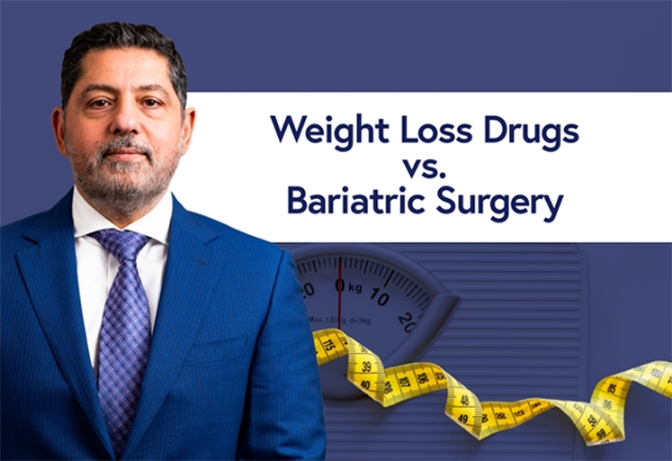Weight Loss Drugs vs. Bariatric Surgery – Which is Right For You?
If you’re trying to lose weight and finding it difficult, you may have considered taking medications or undergoing bariatric surgery. Both of these... read more
Call Us Today (732) 640-5316
E-Waiting RoomA hernia is a hole or enlarged opening that forms in a layer of tissue through which other structures can bulge. The hernia is NOT the bulge itself, but rather the defect through which other structures can protrude through.
Hernias can happen as a result of multiple factors. They can arise in prior incisions (incisional hernia), or as a result of chronic abdominal straining (chronic cough, constipation, prostatism, heavy lifting). Another significant risk factor for hernia development and recurrence is nicotine use in any form, such as vaping, smoking, or chewing tobacco. Obesity, diabetes, and systemic steroids are also risk factors for the development and recurrence of hernias.
In general, for abdominal wall hernias (umbilical, inguinal, ventral, flank, and incisional) there is typically a bulge that may be associated with pain. For hiatal hernias, the symptoms are typically heartburn and regurgitation. For sports hernias (which are not a true hernia) there is no actual tissue defect but treatment often requires a repair technique similar to inguinal hernia repair.
A hernia is diagnosed via clinical exam and oftentimes confirmed with cross-sectional imaging, such as CT scan.
Since there are many different types of hernias, repair techniques vary according to the anatomic location, size of the hernia defect, and technique(s) required to restore the original anatomy. The Hernia Center at Advanced Surgical & Bariatrics of NJ offers the most technologically advanced repair techniques currently known, and most often these repairs are completed with small incisions (laparoscopically or robotically).
It depends. Small umbilical hernias in babies up to two years of age can sometimes spontaneously regress, but in general, as there is no nonsurgical cure for a hernia; the natural history of hernias is progression and further enlargement over time. Some small hernias in adults can safely be observed. The best planning for timing of repair should come from a surgeon with expertise in hernia repair.
Worst case scenario, a hernia can become incarcerated (hernia contents become permanently stuck in the defect) or strangulated (hernia contents become ischemic or necrotic, which can lead to sepsis). Generally, if a hernia remains easily reducible, meaning you can push the bulge flat, it is safe to wait for elective repair. Extreme pain with inability to reduce and subsequent vomiting can be signs of incarceration or impending strangulation and should be brought to medical attention without delay.
Diastasis recti is a condition where the structure in the midline of the abdomen called the linea alba becomes wide and thinned out. A diastasis is NOT a hernia but can manifest as a bulge in the middle of the abdomen upon flexion of the recti muscles, such as the motion used to do a sit-up. Diastasis recti is a reflection of weak core musculature, and can often contribute to back pain and sciatica pain.
Yes, physical therapy is often effective in reducing the size of the diastasis, and surgical repair of diastasis is often done in conjunction with ventral hernia repair.
Yes, most major insurances cover the various types of hernia repairs.
When you meet with a surgeon at Advanced Surgical & Bariatrics, she or he will go over your medical history with you and determine what steps need to be taken to optimize you for hernia repair, so that you can undergo surgery safely.
Sometimes it is possible to repair a hernia using a primary, or suture-based technique only, without the need for hernia mesh. However, sometimes use of a mesh is required. There are over 200 types of hernia meshes on the market for different types of hernias, different layers of the abdominal wall, and a multitude of other variables. Hernia meshes have become increasingly advanced in their technology and construction. For larger hernia defects, hernia mesh provides the needed mechanical strength during the healing process, and it is the scaffold upon which the body rebuilds itself. If chosen properly and placed in the correct anatomical plane, these materials carry an extremely low risk of chronic pain and long-term complications and are essentially transparent with regard to side effects.
Depending on the location and size of the hernia, return to normal activities ranges from 2-24hrs, and return to full unrestricted activity and heavy lifting can take up to 8 weeks.
Depending on your occupation, normal low-strain activities such as office work can generally be resumed in about a week. Heavy labor type work should be avoided for up to 8 weeks as determined by the surgeon.
Due to the cutting-edge Fast Track surgical recovery protocol developed at The Hernia Center of NJ at Advanced Surgical & Bariatrics, most patients have minimal to no pain and take only Tylenol and NSAIDs after hernia surgery. Even patients with large hernias requiring complex open repair with us, in general, have had minimal pain, and are managed with mild medications postoperatively.
Hernia repair failure is multifactorial. Technical reasons such as a mismatch between the mesh chosen for the repair and the site/location of placement, or inadequate overlap most often contribute to recurrence. Other times, patient factors such as continued nicotine use, obesity, and/or uncontrolled diabetes are what lead to recurrence. Most often, however, it is a combination both of technical factors and lack of patient optimization that sets the stage for later hernia recurrence, which can sometimes take years to manifest.
After you meet with a surgeon for consultation she or he will have you then sit with the scheduling coordinator to book your surgery. The coordinator will go over any necessary clearances and testing that you will need to complete before your surgery date. If you do a virtual or phone consultation with the surgeon, the coordinator will reach out to you after the consultation is finished.
A hiatal or paraesophageal hernia is when the hiatus or opening in the diaphragm where the esophagus passes through becomes enlarged, allowing the stomach or other abdominal structures to herniate up into the chest. Typical symptoms include heartburn and regurgitation, but in severe cases of giant paraesophageal hernia, patients can present with anemia due to ulcerations in the stomach caused by the hernia.
Most of the time, the cause is not known. A person may be born with a larger hiatal opening or a short esophagus. Increased pressure in the abdomen such as from pregnancy, obesity, coughing, or straining during bowel movements may also play a role.
Hiatal hernias occur more often in women, people who are overweight, and people older than 50.
A hiatal hernia can be diagnosed with a specialized X-ray (called a barium swallow) that allows a doctor to see the esophagus, or with a diagnostic procedure called upper endoscopy.
Most people do not experience any symptoms of their hiatal hernia so no treatment is necessary. However, for patients with symptoms such as heartburn, non-cardiac chest pain, hoarseness, and regurgitation, there are various treatment options ranging from acid blocking medications to surgery.
Patients with lifestyle-limiting reflux symptoms, patients who have become non-responsive to acid blocking medications, and patients with suspected incarceration or strangulation of the stomach should undergo surgery.
An inguinal hernia is a condition where intra-abdominal structures can protrude through a weak spot in the muscles in your groin. Anyone can get an inguinal hernia but is generally more common in men than in women.
Sometimes the bulge of an inguinal hernia is painful, and sometimes it is not. Often, gently pushing on the bulge can make the intestine go back into your belly. Sometimes, however, the intestine can become trapped in the groin or scrotum and cannot be pushed back in.
Usually a bulge in the groin is the first sign of an inguinal hernia. It can be associated with an ache that gradually gets worse as the day proceeds. Signs that an inguinal hernia is entrapped or strangulated are tenderness, redness of the overlying skin, severe unremitting pain, and the bulge not being able to be reduced or pushed back in. These are serious symptoms that must be treated immediately. Fortunately, it is very rare for inguinal hernias to become incarcerated or strangulated, and most are safely able to wait to be repaired electively. Groin pain that occurs during activities such as sports, running, or exercise may be a different clinical entity called a “sports hernia”, which is actually not a true hernia, but rather a pain disorder caused by underlying core muscle imbalances.
An incisional hernia is one that forms in a previous incision from prior surgery. The incidence of a hernia forming in a previous abdominal scar is approximately 20-60%, and higher in people who are obese or who are active smokers. The hernia defect itself can form anywhere along the scar tissue of a previous incision, and can be very small to large and complex. Incisional hernias can develop slowly over many years or can even occur within a few years after surgery. The underlying cause is usually due to inadequate healing or excessive pressure on the abdominal wall scar.

Dr. Ragui Sadek is a premier surgeon who established a state-of-the-art and one of the safest bariatric surgery programs in the state. Dr. Sadek has fellowship training in both laparoscopic/bariatric surgery and surgical trauma/critical care, allowing him to safely perform complex surgeries on patients who have been turned down by other practices. As a Clinical Assistant Professor of surgery at RWJ Medical School & the Director of bariatric surgery program at RWJ University Hospital, Dr. Sadek offers a cutting-edge range of laparoscopic, robotic, & bariatric surgical procedures with a complication rate substantially below the national average.
Dr. Sadek is a Clinical Assistant Professor of Surgery at Rutgers-Robert Wood Johnson Medical School and a Fellow of the American College of Surgeons. Having performed more than three thousand advanced surgical procedures, Dr. Sadek has established a strong patient satisfaction rate and a solid reputation among the surgical community and is renowned as a top physician in his field by International Association of Healthcare Professionals. As a board-certified surgeon, he holds affiliations with the American Society of Metabolic and Bariatric Surgery and the Society of American Gastro Endoscopic Surgeons. More about Dr. Sadek
Stay current with Advanced Surgical & Bariatrics of New Jersey

If you’re trying to lose weight and finding it difficult, you may have considered taking medications or undergoing bariatric surgery. Both of these... read more

Are you frustrated with your inability to lose weight? Tired of being trapped in an endless cycle of yo-yo dieting, over-exercising, cleanses, and... read more